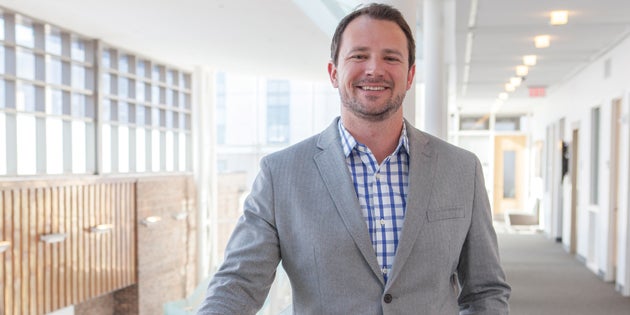If you didn’t know Brett Weyman and struck up a conversation with him, it wouldn’t be long before you thought to yourself, Is this guy for real?
You might think he’s exaggerating when he tells you he was one of the top college quarterback recruits in the nation coming out of high school in 2002. You might cast a suspicious eye when he talks about the months he spent living on the beach in Nicaragua, surfing giant waves and gorging on fresh-caught lobster. When he mentions the multimillion-dollar real estate portfolio of historic Charleston properties he amassed in his twenties, you might have to mask a snicker. Surely he’s pulling your leg when he recounts the three years he spent steering an ambitious business venture in West Africa’s challenging yet promising emerging economy.
But it’s all true. At 31, Weyman has already lived a fascinating and adventure-filled life. And as a nontraditional student in the College’s School of Business, he couldn’t be happier.
Born in Atlanta and raised in Charleston, Weyman excelled at sports and academics at Avon Old Farms boarding school in Connecticut and later at Fork Union Military Academy in Virginia. He was offered a scholarship at Louisiana Tech, where he redshirted before transferring to the University of Tennessee – a move that required him to sit out a year. While he sat, bigger-name recruits arrived. By the time he got onto the field, he was no longer The Man.
“I never found my way onto the field as a quarterback,” he says. “It was very emotional. I sacrificed everything for football.”
Around that time, Weyman received an offer from a friend’s father to oversee the rebuilding of apartments in Mississippi that had been decimated by Hurricane Katrina. The money was good, so Weyman packed his bags and left college in 2006.
Eight months later, after an insurance settlement that was to have bankrolled the project failed to materialize, Weyman moved back to Charleston. He studied his family’s business, and over the next couple of years built a real estate portfolio valued at nearly $5 million.
When the recession hit, he packed his bags again.
Weyman and a former Tennessee teammate headed for Central America for “an extended period of reflection.” They surfed and tossed around business ideas. Another friend suggested they start a trucking business – in Mali, West Africa. Never mind that they’d never been to Africa or knew nothing about trucking. Off they went.
In Bamako, Mali, they found grinding poverty, political corruption and an economy built upon informal payments and favors, as well as a growing presence of Al-Qaeda–linked militants. Despite regular threats to his life and safety – he was assaulted and jailed multiple times – Weyman was not deterred. In fact, he immersed himself into society. Eventually transcending cultural barriers, he became an official trade and commerce attaché to a powerful Malian senator. His job involved forging deals between the local government and foreign businesses to build housing and other infrastructure.
Eventually, the extremists’ threats grew too great, and, following a government coup, Weyman’s local contacts turned their attention from business to survival. So, in March 2012, as Arab Spring uprisings in neighboring countries further destabilized Mali, Weyman headed back to the safety of Charleston.
He’s been at the College for two years, majoring in finance with a minor in real estate. He raves about his professors and the caliber of professionals and guest speakers associated with the business school. He’s had many aha moments when class lectures have shed light on a political topic or business concept that he encountered firsthand in the real world.
“Right now I’m filling in the gaps with my experiences in business,” he says. “My focus is trying to leverage those past experiences for what comes next.”
And, knowing Weyman, whatever comes next is sure to be … well, pretty unbelievable.
This article originally appeared in the summer 2014 issue of College of Charleston Magazine.







